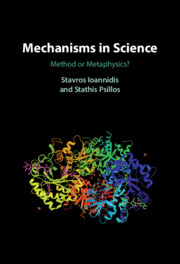Book contents
- Mechanisms in Science
- Mechanisms in Science
- Copyright page
- Dedication
- Contents
- Figures
- Preface
- Introduction
- Part I Ideas of Mechanism
- Chapter 1 Mechanisms, Then and Now
- Chapter 2 Extending Mechanism beyond the Two ‘Most Catholic Principles of Bodies’
- Part II Causation and Mechanism
- Part III Beyond New Mechanism
- Finale
- References
- Index
Chapter 2 - Extending Mechanism beyond the Two ‘Most Catholic Principles of Bodies’
from Part I - Ideas of Mechanism
Published online by Cambridge University Press: 09 June 2022
- Mechanisms in Science
- Mechanisms in Science
- Copyright page
- Dedication
- Contents
- Figures
- Preface
- Introduction
- Part I Ideas of Mechanism
- Chapter 1 Mechanisms, Then and Now
- Chapter 2 Extending Mechanism beyond the Two ‘Most Catholic Principles of Bodies’
- Part II Causation and Mechanism
- Part III Beyond New Mechanism
- Finale
- References
- Index
Summary
In Chapter 2, we continue our historical discussion of mechanistic explanation. The chief purpose of this chapter is to disentangle what we call mechanical and quasi-mechanical mechanism and point to the key problems they face. We begin by offering an outline of the mechanical conception of mechanism, as this was developed after the seventeenth century. We then present Henri Poincaré’s critique of mechanical mechanism in relation to the principle of conservation of energy. The gist of this critique is that mechanical mechanisms are too easy to get to be informative, provided that energy is conserved. We then motivate the quasi-mechanical conception of mechanism and reconstruct G. W. F. Hegel’s critique of the idea of quasi-mechanism, as this was developed in his Science of Logic. Hegel’s problem, in essence, was that the unity that mechanisms possess is external to them and that the very idea that all explanation is mechanical is devoid of content. Finally, we bring together Poincaré’s problem and Hegel’s problem and argue that though mechanisms are not the building blocks of nature, the search for mechanism is epistemologically and methodologically welcome.
Keywords
- Type
- Chapter
- Information
- Mechanisms in ScienceMethod or Metaphysics?, pp. 40 - 58Publisher: Cambridge University PressPrint publication year: 2022

